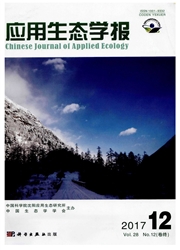

 中文摘要:
中文摘要:
本试验研究了两株益生细菌(巨大芽孢杆菌BM和解淀粉芽孢杆菌BA)与化肥和蚓粪配施对土壤性状、番茄产量和品质的影响.结果表明:与化肥相比,在等养分条件下蚓粪能够提高番茄产量、果实可溶性糖和蛋白质含量,并提高土壤p H和速效磷含量.与单施蚓粪相比,益生菌与蚓粪配施不仅能提高番茄产量、果实可溶性糖、蛋白质、维生素C含量和糖酸比,降低有机酸和硝态氮含量,而且增加了土壤p H和硝态氮含量,降低了土壤电导率;益生菌与化肥配施的效果不如益生菌与蚓粪配施.BA和BM与化肥或蚓粪配施时,番茄品质无显著差异,但BA配施蚓粪处理的番茄产量显著高于BM配施蚓粪处理;BM与化肥配施处理显著提高了土壤速效磷含量,而BA与蚓粪配施处理则显著提高了土壤速效钾含量.本研究表明,益生菌和蚓粪可替代化肥用于番茄生产和土壤肥力改良.
 英文摘要:
英文摘要:
In this study, we investigated the effects of two strains of probiotic bacteria (Bacillus megaterium BM and Bacillus amyloliquefaciens BA) combined with chemical fertilizers and vermicompost on the soil property, the yield and quality of tomato. The results showed that under the same nutrient level, vermicompost significantly increased the yield, soluble sugar and protein contents of fruit, the soil pH and available phosphorus when compared with chemical fertilizers. Vermicompost combined with probiotics not only increased the tomato yield, soluble sugar, protein and vitamin C contents, sugar/acid ratio of fruit, and reduced the organic acid and nitrate nitrogen contents of fruit, also increased the soil pH and nitrate nitrogen content, and reduced soil electric conductivity when compared with vermicompost treatment. This improved efficiency was better than that by chemical fertilizers combined with probiotics. For BA and BM applied with chemical fertilizers or vermicompost, both stains had no significant effect on tomato quality. When co-applied with vermicompost, BA and BM showed significant difference in tomato yield. High soil available phosphorus content was determined when BM was combined with chemical fertilizers, while high soil available potassium content was obtained when BA was combined with vermicompost. Our results suggested that probiotics and vermicompost could be used as alternatives of chemical fertilizers in tomato production and soil fertility improvement.
 同期刊论文项目
同期刊论文项目
 同项目期刊论文
同项目期刊论文
 期刊信息
期刊信息
